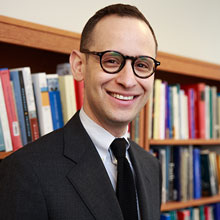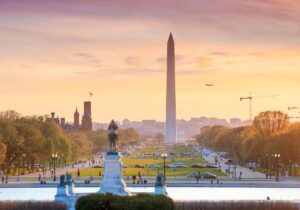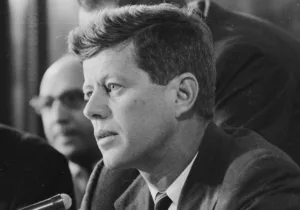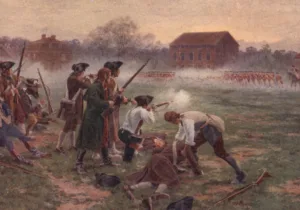Sam Goldman of George Washington University reflected on the 2020 presidential election and how it relates to culture, history, and global affairs.
Rough Transcript
Tooley: Hello, this is Mark Tooley, editor of Providence: A Journal of Christianity & American Foreign Policy, and today we are not having our usual happy hour evening, but rather a mid-afternoon coffee break, so to speak, featuring, I’ll call them political scientists, Sam Goldman, Professor at George Washington University, a contributing editor to The American Conservative, literary editor at Modern Age, and author of a wonderful book on Christian Zionism in America. Someone who is very reflective and well-informed on American politics within the wider context of culture and religion. So, I’ve asked him to offer us a little bit of an analysis about what election 2020 means in this wider cultural, historical religious, and global context. I should also warn you that possibly depending on the state of his automobile, Josh Mitchell of Georgetown University may be joining us at some point during the next hour. Otherwise it will be Sam Goldman and myself. And if you are participating, please put yourself on mute so we do not hear your sounds until there is a time for you to ask a question of Sam Goldman. So, Sam, thanks so much for joining us.
Goldman: Thank you, Mark. And I must say that I had been accused of a number of things over the course of my life, but political scientist is probably the worst.
Tooley: Well, I hope it wasn’t too degrading.
Goldman: Nevertheless, I won’t hold it against you. So, I’ll really say very little by way of introduction, because I know that we have all been reading and watching and perhaps thinking of little apart from the election. Certainly, over the last week, and in many cases for quite a long time before that. And I don’t know that I have anything very significant to add to the things that many of us have read and seen. I certainly don’t have any information about the state of the race that’s different to the public polls that are widely circulated on social media, nor, despite your generous description of me as a political scientist, do I have any specific methodological or expert insight into the composition of those polls and the ways in which they might or might not be misleading. What I will say, though, is that it seems to me that this election is going to be a disappointment to a great many Americans no matter how it turns out. And I say that not only because there are two major, major candidates and only one of them can win, but also because I think that many of us are hoping that this election will provide a resolution to a sort of national identity crisis and that the victory of President Trump or Joe Biden will answer the question of who we are, what kind of a country we are, perhaps not once and for all. These answers are never entirely final, but at least for a long enough period to allow us to catch our breath and adapt to stable political and cultural environment. And my prediction, my hunch, perhaps even my fear, is that that’s simply not going to happen, whatever the outcome. This is likely to be a relatively close election. I am poll skeptic enough that I will discount as outliers the polls that show Joe Biden with a double-digit national lead and, of course, even a large national lead is compatible with much thinner margins in particular states. But furthermore, I don’t think that the victory of either candidates is going to settle the questions about the meaning of America, about the criteria for membership in the nation, or about our purpose in the world that we want so badly to be answered. So, in some ways, it feels as if this tension, this anxiety has been building toward a climax and we all hope for, many of us, I think, hope devoutly that there will be an answer one way or another relatively soon after the closing of polls on November 3. But I just don’t think so. I think these questions remain with us that the basic divisions that the last election have revealed will continue, and that the political and cultural landscape of 21st century America is going to remain extremely unsettled. Again, no matter which candidate is victorious.
Tooley: You’ve often made the point that it’s conventional wisdom that America has never been more polarized than it is in the year 2020, but your refrain has been that our basis of comparison is years of postwar consensus. So, after World War Two. And in fact, America, more commonly has been extremely polarized. Could you elaborate on that?
Goldman: Yeah, I mean, this is an argument that I’ve made in various forums and have a short book scheduled to be published in May about. I think this condition is closer to the historical norm than the nostalgic memories of post-war consensus between, about Federal troops, not National Guard but active duty US Army soldiers, accompanying black children to school in Little Rock, Arkansas is a vivid reminder of, that those were not times of universal agreement or the consensus about basic questions of justice and social order. But even so, there was a, I think a stronger sense during roughly that period of common enterprise and common assumptions to which Americans could appeal, even when they drew different conclusions from those premises. Now, it often seems that we aren’t even speaking the same the same language. And one sees some evidence of this in some of the polls, or the journalism in which writers visit different parts of the country, and people are just not talking about the same things in the same way. And too many Americans now, I think especially those in late middle aged and older, that seems like a big change from what they remember. But I think it’s actually, it’s actually not so very different from some previous periods. I’ll leave aside the Civil War and the crisis that immediately preceded it, which I think was exceptional in its own way. But in the late 19th and early 20th century, there was tremendous moral, political, and cultural anxiety and conflict. Conflict that sometimes led to violence. And now some commentators have written, or speculate, as to whether our present situation looks more like Weimar Germany or perhaps Russia in 1917. I think looking more carefully at the so-called Gilded Age, or for that matter, the first decade or so of the American Republic, reveals that these are not new questions. And that’s why I think they’re not going to go away. Again, no matter which candidate or party is more successful next week.
Tooley: Now, you said Americans less and less seem to be speaking different languages. Was the more cohesive language that you look back to basically Protestant-inspired civil religion that others, including Catholics and Jews, also fit fairly neatly into, and which especially crystallized after World War Two?
Goldman: Yeah, I mean, in the first place, and this may seem obvious, but it is worth emphasizing, that that common language was English. The generation of Americans that populate the country in 1968 was the most native born of any for more than a century that had preceded it. So, a generation or two prior to 1960 and a generation or two later on, American life was characterized by sort of a literal cacophony of languages, many of them brought and sustained by immigrant communities. That was not the case in 1960. So, in 1900, sticking again to language in the literal sense, Quebecois French was widely spoken in New England. Italian, Yiddish, Cantonese were widely spoken in American cities. German Americans had a virtually autonomous network of cultural institutions throughout the Midwest. And it was possible even for a great American theologian like Reinhold Niebuhr to receive no formal education until he went to Yale for graduate school, which is sort of sort of amazing. He went through his whole educational career until graduate school in German in a way that I think Is less shocking today than it was in 1960. So, that’s one difference. Another, as you mentioned, is that the sort of dominant cultural framework of that period was a form of Protestant inspired, or post-Protestant civil religion, which was not altogether new. I think the symbols and rhetoric of this this civil religion extend quite a long way back in American history to the colonial period in some ways, but it was really during and immediately after World War Two that it became the dominant idiom of American public life. And in order to do that, it was necessary to distance it a little bit from its original Protestant theological and denominational origins. So, some of the concepts, the appeals to covenant, to redemption, to Providence, are clearly associated with Protestant traditions in political theology and historical interpretation. But during and after the war, it was made a little bit more neutral, partly for strategic reasons. The Roosevelt administration considered it extremely important that Americans of immigrant, or non-Protestant, background would be able to feel themselves included not just because it would be nice, but because their efforts were needed to mount a successful campaign against Germany and Japan. But also, because the entrance of these communities into the mainstream American life forced a sort of cultural and linguistic compromise in which they acknowledged implicitly that the country had a distinctively Anglo-Protestant history, but it was argued and sometimes stated explicitly that had given way to a broader and more universal understanding of what it meant to be American. And that sort of cultural compromise, which can be described as post-Protestant, some scholars talk about tri-faith America, taking a cue from the sociologist Will Herbert. Others talk about Judeo-Christian America. That has really eroded. And if, on the one hand, the sort of questions that set us are not new, the absence of common ground, or at least a common stock of stories, vocabulary, metaphors, images to call upon, that really hasn’t occurred at least within the lives of virtually anyone now participating in public affairs.
Tooley: Now, we’re told we live in a more secular time than ever before in America and in the West, and yet, ironically, religious conservatives play an essential role in the Republican electoral coalition and perhaps are more influential than ever before. And we also have the Democratic Party candidates highlighting their own faith, so religion seems to still have a very strong ongoing importance and residence in American political discourse. So, how do you put that together with the increasing secularism?
Goldman: I think it depends what you mean by secularization, which is one of these classic grand concepts in social science that is susceptible to have a variety of interpretations. So, one meaning of secularization is that religion, or religious institutions, have just sort of disappeared from public life. And I think secularization in that sense hasn’t happened. Certainly not to the degree that it has happened in parts of Europe. As you say, the major candidates for the presidency and vice presidency are quite vocal about expressing their religious identities, or at least religious sympathies. And that’s true also lower down the political food chain. And beyond that, I would say that even many movements that are nominally secular had drawn on religious concepts or religious energies. And I think that if Josh Mitchell is able to join us, that’s something he would talk about. He has written a book that discusses how, in his view the most recent version of the progressive left, even though it is nominally secular and, in some variations, even explicitly hostile to religion, does draw on originally religious energies and concepts. And I was even having a discussion about this on Twitter earlier today. It’s been suggested that one reason that people use different terms, critical race theory or intersectionality or weakness, has only caught on in the United States and in countries like Britain that are heavily influenced by the United States, but not in France, as it draws on originally Protestant religious energies and assumptions that aren’t available in the same way in a historically Catholic society like France. So, in that sense, I quibble with the claim that politics have secularized. Here’s the version that I do agree with…
Middleton: An example of that, absence of analogies or common principles, here in the US not present in the French situation is BLM.
Goldman: So, one of the differences that seems to be emerging in France is a very strong rejection by the French political and even cultural elite of the sort of guilt and redemption model of social relations that seems to inform BLM, right. I mean, the whole rhetoric of the Black Lives Matter movement, and I want to say movement, because the movement is not the same as the specific organization that uses that name, seems to be a sort of demand for collective atonement. And it’s largely been a successful demand. And we’ve heard, many of us, or even seeing, major public figures confess their guilt and beg for forgiveness in a mode that is very hard not to see as implicitly religious. I mean, I find it hard to look at a photograph of Democratic members of Congress kneeling in atonement and not see it as a kind of religious ritual. That sort of thing doesn’t seem to be happening in France, on the contrary, at least so far. Macron and many of the people around him are asserting, or sort of reaffirming, a much stronger commitment to secular republicanism to national values and to what we would call colorblind citizenship then I’ve seen evidence of in the United States. And I think that is partly a consequence of historical religious differences.
Tooley: All right, time for questions or comments from any of our other participants.
Goldman: Well, can I just say one more thing, Mark. Just quickly, because I want to say the form of secularization that I do think is happening, and this is the form that Charles Taylor articulated in his book A Secular Age, is also parallel to what the late Peter Burger called “pluralization,” which is, I think, a better name, because what has happened is not that religious ideas or communities or affiliations have disappeared from public life, but rather that they have become subject to choice. And being a Christian or a Jew or an atheist or what kind of Christian or Jewish or atheist or Muslim one prefers has been recognized as a matter of personal choice in a way that is fairly novel. It hasn’t just started in the 20th century. I think it probably extends back to the beginnings of the Protestant Reformation, but is particularly acute now, and that I think links up with the sense of anxiety and unsettlement that I mentioned at the beginning of my remarks. It’s not that any of the historical answers to these questions about national identity and purpose aren’t available, you can believe whatever you want and you can write and read books that make the case for many of them. What it seems that we can’t do, or have a hard time imagining doing, is moving from voluntary affirmation. Here’s what I think is right, and here’s a group of others with whom I share this commitment, to a broader and more communal sense of identity or solidarity. So, as with religion, it’s not that religion disappears. But it’s individualized and made more voluntary, and that’s rewarding. In some ways, right, you have freedom to pursue the truth as you see it and to affiliate with those who see things the same way, but it can also be very frustrating and alienating and lonely.
Tooley: Any questions or comments?
Goldman: I think Richard had a question.
Hyde: Yeah, very good. Let’s see, I guess what concerns me about the current age, and I’d love your comments on, you know, comparative on this of our pictures of the enemy. If you just pick up any newspaper or look at the negative ads, you find that both campaigns now are just dripping with horrible images of what the enemy is like, in other words, the horrors of Trumpland on the one hand, and the horrors of Woke-a-stan on the other. Amplified through the advertising industry and all the tricks that advertisers know how to use. And sometimes I think, “My god, I can’t imagine that the ads that John Kennedy and Richard Nixon put out in 1960 were this just utter disparaging of one another.” And I think that’s part of our problem. Our fears are being played upon by an advertising industry beyond compare and I think without parallel.
Goldman: If it’s without parallel, I’m not sure. I mean, you know in 1800 famously Jefferson was depicted as a Jacobean atheist actually. That may prefigure some of the rhetoric today. And clergy in New England told their congregants to go vote for John Adams, because Jefferson would call him the French, take away their Bibles, and I think Trump has said something similar, that if he is not reelected, there will be no Bible, no God, no religion. So, that in itself is not new. And there are other examples from other periods of American history of really quite vicious and bitter rhetoric, including the, the anti-Catholic Appeals that were deployed against Al Smith, who was accused of being a servant of the Vatican, and you know, promoting the corruption of America’s children and and so on. So that too is nothing new. I do agree though that Social media seems to be very bad for our brains and I am aware that this has been said about every new medium, going back to Plato’s criticism of the invention of writing as as damaging to to memory but but even so, It does seem that we have trouble processing. The enormous amount of information. You know, fire hose that that’s directed at us and also the possibility of instantaneous response. I mean even the President himself. Who has made very effective use of social media said at one of his rallies recently. In the old days, maybe you would write an angry letter to someone and then you would leave it on your desk and you would look at it the next day and say, No, I’m not. I’m not going to send that. But now you hit send, tweet and it’s immediately broadcast, not only to its intended target but to everyone to everyone in in the world and being stuck at home as, as so many of us are. I can see from the video probably makes that even worse. So, in my view, it’s not so much the content. That’s changed particularly once we look beyond that mid-century interlude of consensus and the 1960 Kennedy-Nixon election was probably the least Ideologically differentiated election, certainly in modern America. Even so, the media conditions are very different. And I don’t have the brilliant solution to that problem. You know there are suggestions in Congress that there could be regulatory forms reforms that would be that would be helpful. I don’t know.
Tooley: Any other questions or comments for Sam Goldman?
Howard: I know you were pretty down on The idea of consensus, you know, during WWII and post-World War Two decades. But it does seem to me that there was a stronger sense of consensus than there is now. It’s commonly remarked that in World War you had a Protestant, Catholic and Jew together in a trench for an awfully long time and they kind of figured out that some of the stereotypes they had about each other and weren’t true. So you’re right. I’m reading this book. Maybe some of you have read it: David French’s Divided We Fall, United We Stand on what does the secession crisis could look like. So I guess I’m just curious. And if you could explain some recommendations for how we could maybe build consensus, what an American nation is in 2020 so that we in some inclusive way, that includes some of the groups who are offended by sometimes by the President, you know, immigrants, refugees, but also we the “deplorables.” How do we get all these people together and into one nation?
Goldman: I think that we can recover the kind of consensus that you’re describing, and I think you’re right to push back a little bit. Maybe I’m not sufficiently crediting it for its virtues which were real. But here’s the thing. On my interpretation of the history of the 20th century, and I go into this at length in my forthcoming book that was the product as you acknowledge of basically three world wars, two hot wars, World War One and World War Two and then one Cold War. And in the absence of a global ideological conflict on that scale really lasting with some long interruptions from 1970 and until 1989 I think it’s going to be very, very difficult to restore the relatively open form of consensus that you’re describing that many people remember fondly. I think we need to go in the in the opposite direction, not as far as secession, but I really think that jurisdictional and communal and institutional autonomy iss the only not solution, but the only plausible option, corresponding to my view about sort of pluralization or volunteerization. We need to figure out how to let people who agree about many things, if not all of them. To live together and run their shared lives in ways that are reasonably satisfactory to them. And in a country of approaching 350 million people spread over thousands of miles I just don’t know how that’s possible.
Tooley: Any other questions for Sam?
Six: So my name is Isaac Six. I’m the director of advocacy for Open Doors, USA. And my question is for Professor Goldman, you mentioned earlier, sort of the religious undertones or overtones of certain movements like the Black Lives Matter movement. You mentioned legislators, you know, kneeling and things like that. At what point did these movements cross the line into a religious movement. And if so, then at what point do they fall sort of under the protections and the restrictions that the First Amendment would offer only if they self-identify as religious? Or as long as you identify a secular you can basically take whatever position you want and there’s really no First Amendment issues involved whatsoever. Right?
Goldman: Yeah, I mean I can’t really address the technical legal question,, which has come up in some of these discussions, you know what does an establishment of religion mean when you’re no longer talking about a religion in in the familiar In the familiar sense. I mean, I think that, in the absence of an appeal to some transcendent source of order and purpose you’re not really talking about religion in any familiar sense. There might be ideas or movements that are descended from religion or that have a religious structure, but they’re not exactly religions as I understood understand them. That said, I think you’re pointing correctly to a problem that emerges when people don’t share basic first principles which can often happen under conditions of religious pluralism, which is that it gets very, very difficult for them to get along and what looks to one faction or population like a perfectly reasonable set of communal norms looks to another like a form of a form of oppression.
Tooley: Anyone else with questions or comments for Sam Goldman?
Middleton: Yeah, I’m Gordon Middleton of Patrick Henry College. Just to pick up on your remarks with regard to think you called it pluralization.
Goldman: Not me, Peter Berger.
Middleton: I’m curious as to how you see that I would say in terms of reasonably stark contrast with some of what we are seeing within our American society today in terms of things like cancel culture, the BLM movement itself. Certainly the move left if not to full capital Leftist, sort of doctrinaire enforcing and some of these things mutually enforcing themselves. Do you see those things taking us in a opposite direction from pluralization and if, if so, how do we deal with those sorts of trends in our society, or do you see these as more temporary or something that will not last within our cultural milieu?
Goldman: I mean, I think those are responses to pluralization, which is an uncomfortable phenomenon and we’re all familiar with the sort of a textbook story of how religious establishments tried to suppress dissent and heterodoxy and all sorts of terrible, terrible ways. There seems to be a parallel to that in some versions of so-called cancel culture. And that’s one of the reasons that I see them as being akin to religious movements, rather than alternatives to them. As for the future again I don’t know, I think historically American culture has experienced these periodic bouts of moral panic often infused with religious or pseudo religious fervor and in the past they have to some degree burnt themselves out over a period of years because they’re extremely morally and emotionally demanding. It’s exhausting to be angry all the time. And that was true of the anti-Catholic and anti-Masonic movements of the early 19th century. That was true in some ways of the abolitionist and racial equality movements of the middle 19th century that was true of prohibition. That was true of 1960s Leftism and so on. Does that mean that we can just wait for the storm to pass? I would say no. I think the essential task is to defend genuine pluralism from what I would call pseudo pluralism and finding ways for people who really do disagree with each other on significant questions to live together in peace. And as I said, I think that requires more institutional and jurisdictional autonomy than we’ve been able to sustain recently, but that also means opposing fake pluralism, which is the sort of pluralism that you see in university marketing materials where everyone looks different, everyone has a different background, but they all think the same thing. So if I needed to describe the task for the future or present a slogan, it would be real pluralism, not fake liberalism.
Tooley: Well, we’re going to start winding down. Is there a final question or comment for Sam Goldman? Sam, your book coming out next year is called After Nationalism. Summarize for us, please, what that’s going to say.
Goldman: So the argument of After Nationalism is that, contrary to what I think is a popular narrative there really was no single stable sense of American national identity from 1776 until 1963 or whatever endpoint you want you want to choose. But as I’ve been suggesting this afternoon that this process of debate, of conflict, of reinterpretation and renegotiation has really been ongoing and as again I’ve suggested I think that rather than trying to end those questions and those debates once and for all, we should rather embrace them and be willing to accept more sort of superficial disagreement and conflict in order to avoid the really fundamental conflicts that do lead in the direction that David French and others have described of secession or even civil war. Everyone knows the image of the child who sticks his hand into the cookie jar and then can’t pull it out because he’s gripping the cookies. I think we are in a somewhat analogous position and that in order to extricate ourselves, we have to be willing to let the rewards go a little bit. There’s not going to be a consensus that is going to satisfy the vast majority of the country, how whatever you construe that majority to be. And that means we’re going to have to learn to live together in ways that will be uncomfortable and challenging, but I think in the end are better than not living together.
Tooley: Sam Goldman, political scientists and professor at George Washington University, thank you for a very fascinating conversation and hopefully we can check in again sometime after the election. And thanks to all of you who have joined us for this exchange.
Goldman: Thank you, Mark. It’s always a pleasure.
Middleton: I’m curious, Sam, if you have any thoughts on if we extrapolate from what you just described, one possible thought might be this is actually an opportunity for federalism, to have a new golden age as part of that realization.
Goldman: I would hope so. I mean, I think federalism, both in the constitutional sense but also even just sort of a broader sense of distributed authority has to be part of the solution. And there’s just no reason to think that the policies that are satisfactory in California are going to be satisfactory in in Kentucky, and the more we can make it possible for people to govern their own affairs in ways that reflect local preferences and commitments as much as possible, I think, the easier it will be to find to find peace.
Tooley: Thank you again. Bye-bye.






